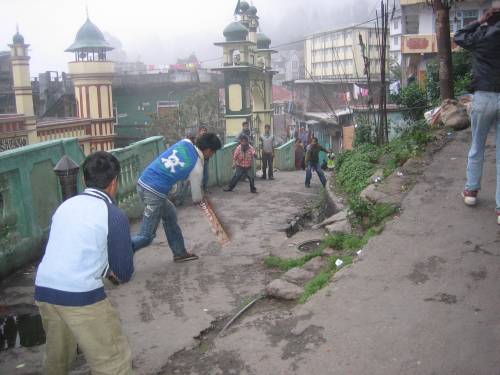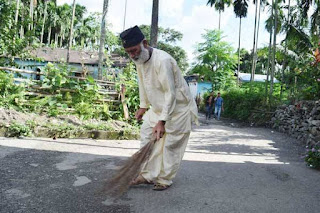Growing up in Darjeeling today is very different than how we grew up. Today parents believe in raising their children in an environment so protected that even when they are wrong, they take a stand to protect them, and instead shift the blame on others. We didn’t have that luxury. Our parents believed in the hearts of their heart that only an anvil and a hammer can make a crooked iron straight. For them we were crooked iron that needed hammering every once in a while.
Among the very dreaded tools used to straighten us up, perhaps the “Bata ko Chapli –flip flops from Bata” was the most common, every mother would always have it “handy or feety” for they would be wearing them and whenever they felt the need, in a blinding movement, the chapli would be out of their feet and onto our head, before we even realized what happened.
 |
| Sishnu |
And being the lazy kind, I would respond, “aaachhhh ek chin ma lyaunchu – in a bit”…
All I would see was a moment of flash, and Bata ko Chapli ko chaap on my gala.
That would sort me out immediately, my vigour recharged… I would call out truce
“Khai jarkin… khai jarkin?”
I am sure many must have lived these moments.
God forbid if anyone had family in the army, they would bring back Kohlapuri Chappal and that was more painful, cuz they were made of pure untreated leather... more painful and much more effective than Bata ko Chapli :)
But even before the Bata ko chapli, some of the most classic tools used to straighten us didn’t need any external devices. I don’t know anyone from Darjeeling who hasn’t lived through the phases of Toksing, Thappar, Ghussi, Kaan Tannu, Khatana (hair on your temple) Tannu and Laat… I am certain; my mom could have easily taught Bruce Lee a shot or two from these wide array of handy means to subdue a wayward opponent.
I remember to this day my 1st ever Mukh Chyateko – the one where Mom would put her two index fingers into our mouth and pull them in opposite directions, till our mouth was on the verge of tearing apart and we’d cry for mercy. What an ingenious way to make a mukhale chora/chori learn some manners.
I was very young, must have been 5 or 6 years old, and we had a function in our house. One Gaon ko Badi called me and I must have pretended not to hear… so she called me two or three times and finally when I looked up she was annoyed, so she said, “eta munti bhaneko suninas? bring your butt here”
I was a little dumb to begin with when it came to manners, and my mouth would shoot off stuffs, without my brain registering it till about 5 seconds later. So habitually, without realizing what I was saying, I said, “Tapai nai muntinos na eta…why don't your bring yours here...” on top of my voice.
I could hear the whole room go silent. Literally, there was a hushhhhhh in the room.
I knew, I was in trouble.
Then Mom came rushing towards me, “K hare? Badi lai K hare?” and then she Mukh Chyatus mine… I have never forgotten that incident, cuz that aligned my mouth to my brain connection and I started to think before speaking out.
What a cure that was.
Ekkai khep ma jati bhaye mo.
Today, they say “corporal punishment” is illegal. During our times, our parents would make sure to tell our teachers, “Ghar ma tyaakai terdaina, Sir alik tapai le thik pari dinu hos ta…. He doesn’t listen to us at home, please teach him some manners,” and they would say that in front of us. Imagine a parent giving carte blance – blank cheque to the teachers to “Thik Parus” us.
“Kaath ko Feet – wooden ruler” was perhaps the most common tool to straighten a crooked student in school. From anyone making noise in the class, to not completing home work, to not wearing proper uniform – three to five hits from the “Kaath ko Feet” would be the standard cure. Next day, all homework completed, proper uniform worn, no noise making in the class.
At times they would put pencil or pen between the fingers and push the fingers together, oh the horror of it. I still shiver at the sheer ingenuity of that trick.
I honestly feel our elders were geniuses in Psychological treatment of a wayward child.
Then there was this one time, I was still a kid, on a Sunday, walking towards Chowrasta with two of my friends, and as we started to walk up from Club Side (right below Keventers), someone from the road above dropped a lit cigarette butt. I picked it up, and my friends dared me. So I took a drag. The moment I did that, they said they would tell my Mom, I had smoked a cigarette, and they did (they are no more my friends).
Once we arrived at home, my Chema found a piece of Kalo Polythene ko Pipe, and the beating I got that day with it. I haven’t smoked till today, and that incident has helped me turn into an environmentalist, for I hate everything plastic. No plastic bags, no plastic buckets, and more importantly - no plastic ko pipes around.
As I grew older, my nature and extent of naughtiness spiked. One time a few of my friends, my elder brother and I ran away from school (school bhagera) to go swimming. None of us knew how to swim, but we all went to a khola nearby. When we got back to school, it had been around 5 PM. Baba was freaking out as he had come to look for us raicha, school got off at 3:30.
Man the agony of knowing you are gonna get a nice licking and waiting for that to happen.
Baba was in the Artillery and he had this ceremonial belt, which he would polish and keep “tillikkaaiiii talkeko – shiming” everyday, and being a military man he was a gentleman. So once we arrived home, he told mom to serve us food and mom gave us “dui dui ota roti – two rotis” and sabjee.
If there was a world record for taking longest time to finish two rotis, my brother and I must have broken it that day. We took over 3 hours to finish the two rotis, but Baba didn’t rush us. All he would say every once in a while was “ajjhai dhilo kha timaru… tara aju huncha toh haru ko Puja – take all the time you need, but you can’t deny the inevitable”… and he was right.
Man!! What happened that night, I cannot describe, suffice it to say, I still don’t know how to swim, and I think its overrated anyway. Let me put it this way, the shinny Artillery belt cured me of my dreams of becoming Michael Phelps forever. I am naturally allergic to water now.
Paani dekhda pani tarsine scene :)
But the mother of all tools was Sisnu (Nettle) Paani treatment… especially if the sisnu was Bhangre sisnu.
Does anyone remember using Sigaan (snot) as a handy cure to preventing Sisnu le poleko rash? To be honest, the relationship between Shisnu and Sigaan is what makes God infallible for me... So Sisnu polus you, and you cry your heart out and become siganai-sigan, and use that very sigan to ease the Sisnu le poleko pain... God is a perfectionist...
But, if I have to count the number of times I fell on Sisnu, or mom used Sisnu paani treatment on me, I would probably need a barrel full of Sigaan to subside the pain hola.
Naughty as I was, in my teenage years, I came home drunk once, and mom found out. That day she experimented for real, starting from Bata ko Chapli to Jhadu to Kuccho to Dadu Kucchin jel, she eventually landed with Bhangre Sisnu picked up from our bari.
Amamamama 15 seconds into Sisnu Pani treatment I became fresh, and a minute into it, my long dead ancestors must have become fresh too.
I didn’t touch alcohol for the next 10 years, and even now I can’t drink more than a half-bottle of beer. That Sisnu Pani treatment comes flashing back, and I would love to avoid it at any cost.
Recently, I was surfing the net and was shocked to find out that Sisnu is actually a medicinal plant raicha and it is used to cure painful muscles and joints, eczema, arthritis, gout, anemia, urinary issues, baldness, as well as allergies and joint pain, promote lactation, stimulate hair growth, help control blood sugar in patients with diabetes, reduce bleeding connected to gingivitis, treat disorders of the kidneys and urinary tract. Sisnu is even used to slow the spread of Prostate cancer raicha. All you got to do is, dry the plant and then boil it and drink it as tea for a month.
Imagine, weren’t our parent’s geniuses? Giving us medicine, without us even becoming aware of it?
Indeed, times have changed, and today people are more “sophisticated”, but thanks to our parents and teachers and their earthy sense of right and wrong, that has helped shape us into becoming who we are today.
Having said that, my Mom still tries to impart her “Bata ko Chapli” discipline on me, and I love it.... At times I just provoke her to see how she reacts, and every time her instincts guide her hand towards her feet, but now I can duck faster, while she swings slow.
What about Sisnu? You may ask…
Well as I was writing this, “Aju ta Sisnu ko Daal Khaun la Chora….” says Ama… I smile, with relief, of course, and say feebly “pakako hola ni?” unsure still :)
…and thus continues the Sisnu Chronicles…
[Dedicated to my brother Mohammed Asif whose pic, shared here, ensured that I wrote this article]
.......................................
If you did enjoy reading this, please don't forget to SHARE... help us share some nostalgic cheer around.
Via The DC




















